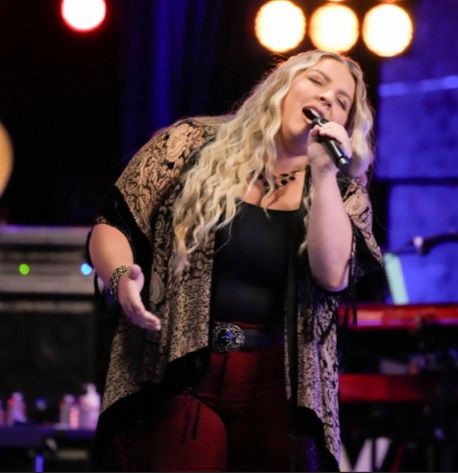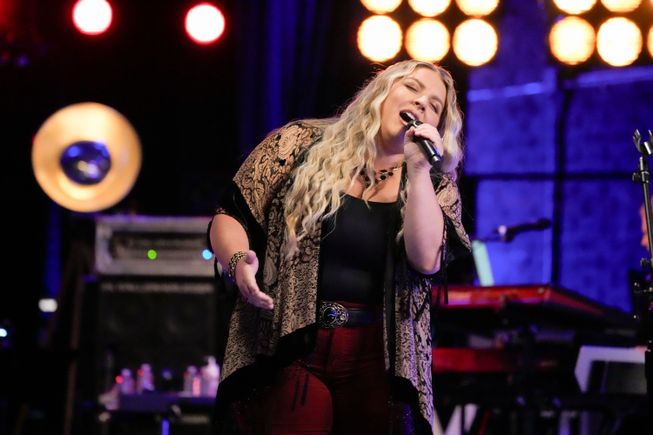Good stories over love songs

Local country songwriter Kennedy competes on ‘The Voice,’ pursues career in Nashville
By Amy Kyllo
STAFF WRITER
When a New York talent scout reached out to rural West Concord native Cori Kennedy about singing on “The Voice” after watching one of her TikToks that had 200 views, she thought it was a prank.
“He was like, ‘Let’s jump on a Zoom call,’” Kennedy said. “I was like, ‘Yeah, OK, sure. Liar, whatever.’ But then we got on the call, and he was very much real.”
That initial Zoom call led to Kennedy performing on Season 28 of “The Voice,” working on team Reba McEntire.
“Once you get on stage and the music starts, everything just melts away,” Kennedy said. “But when you’re backstage and you hear the audience hooting and hollering, and you hear the coaches’ voices on the PA system there, it’s like, … ‘This is real.’”
Kennedy advanced through the show before taking her final bow in the “Knockouts” round. Season 28 of “The Voice” can be streamed on Peacock or is available for rent or purchase on Amazon Prime Video.
Kennedy grew up in the country, and her grandparents farmed, with sheep on one side of the family and dairy cows on the other. In the summers, Kennedy and her siblings participated in 4-H, showing sheep.
“My grandma Kennedy, she had a round baling business, so we used to sit in the cab with her,” Kennedy said. “We were definitely very much a country-living type of family.”
Kennedy said her grandparents on the Kennedy side have had a big impact on her music career. The couple bought her a keyboard that she eventually took to college, and they would give her the keys to their rural church in Berne, where she would go play the piano and sing late at night.
“My grandparents are very classic Western,” she said. “My biggest (music) inspiration is all those old cowboy storytelling songs. … I could care less about a love song, give me a cool story.”
Kennedy was scouted for “The Voice” last winter, with that first Zoom interview leading to more calls as the network deliberated.
“You jump on these Zoom calls, and there are hundreds of people,” Kennedy said. “Every Zoom call you get on, the number just gets less and less.”
During the deliberation period, Kennedy’s single, “Hey Who Shot The Water Tower” was released and went viral with 16 million views on TikTok. She said she thinks its popularity helped catapult her onto the show.
In July 2025, Kennedy performed during the “Blind Auditions Part 3” of “The Voice.” She said she almost did not go to her audition, but her fiance encouraged her to go.
“He was like, ‘No, no, no, you’re going to go do this,’” Kennedy said. “(He said), ‘You got to, because there will always be a nine-to-five waiting for you no matter what. … Even if you pursue music as a career and it fails, you can always come back to nine-to-five. Those aren’t going anywhere.’ But he’s like, ‘You really only get one shot to do this.’”
Kennedy said she told herself the worst thing that could happen was that none of the judges turned around.
“They’re not going to take your birthday away,” she said.
Kennedy said it was a freeing moment when McEntire turned around, locking in Kennedy to advance on the show.
“Then, I (could) have fun with it and perform,” Kennedy said.
She said having Reba McEntire as her coach fit with her blend of upbeat music and sometimes dark storytelling songs.
“I got to be mentored by one of the best in the business and someone I look up to so much as an artist,” Kennedy said. “I love the stories in her songs.”
Kennedy’s music career started slowly. She taught herself piano after deciding to quit lessons after a few months as a child. In high school, she excelled in sports and was an all-state athlete in softball, volleyball and basketball.
She went to college at Minnesota State University, Mankato to play softball, including catching 71 games for Mankato’s NCAA Division II Softball National Championship team in 2017. At 23, Kennedy used the internet to teach herself to play guitar. By her mid 20s, she began song writing.
“I was like, ‘There are not enough storytelling songs nowadays,’” Kennedy said. “I was like, ‘Well, just shut up and write them. Just do it.’”
Kennedy, who has two original songs released so far, said she is willing to write about anything.
“A lot of the songs I write, there’s a lot of happy, catchy stuff,” she said. “There’s also some where it’s like, they’re a little darker. … I want people to feel something and be entertained, whether it’s the lyrics are really funny (and) that can make people laugh … (or) also just something that’s toe-tapping.”
From a career standpoint, Kennedy said being on “The Voice” amplified her online following. As of mid-December 2025, Kennedy had 2.8 million likes on her TikTok account and over 100,000 followers on Instagram.
In the fall of 2025, Kennedy and her fiance moved to Nashville, Tennessee, for Kennedy to pursue a full-time career in music.
“We both talked with one another (and) we’re like, ‘We’re going to look back on this one day and remember this exact feeling of we up and quit our jobs, found a place in Nashville and moved out of our house,’” Kennedy said.
Since moving, Kennedy has been focused on building her business.
“We’re really doing a ton of behind-the-scenes business work,” Kennedy said. “We got my management selected. … It’s just all about building my team and finding the right people that align with not only who I am as an artist, but as a person.”
Kennedy said it is surreal to be pursuing a country music career.
“I would have never expected myself to be doing music as my full-time job,” Kennedy said. “It’s just crazy, because it’s something that I’ve always wanted to do, but I’ve never had the time or the resources.”
By Amy Kyllo
STAFF WRITER
When a New York talent scout reached out to rural West Concord native Cori Kennedy about singing on “The Voice” after watching one of her TikToks that had 200 views, she thought it was a prank.
“He was like, ‘Let’s jump on a Zoom call,’” Kennedy said. “I was like, ‘Yeah, OK, sure. Liar, whatever.’ But then we got on the call, and he was very much real.”
That initial Zoom call led to Kennedy performing on Season 28 of “The Voice,” working on team Reba McEntire.
“Once you get on stage and the music starts, everything just melts away,” Kennedy said. “But when you’re backstage and you hear the audience hooting and hollering, and you hear the coaches’ voices on the PA system there, it’s like, … ‘This is real.’”
Kennedy advanced through the show before taking her final bow in the “Knockouts” round. Season 28 of “The Voice” can be streamed on Peacock or is available for rent or purchase on Amazon Prime Video.
Kennedy grew up in the country, and her grandparents farmed, with sheep on one side of the family and dairy cows on the other. In the summers, Kennedy and her siblings participated in 4-H, showing sheep.
“My grandma Kennedy, she had a round baling business, so we used to sit in the cab with her,” Kennedy said. “We were definitely very much a country-living type of family.”
Kennedy said her grandparents on the Kennedy side have had a big impact on her music career. The couple bought her a keyboard that she eventually took to college, and they would give her the keys to their rural church in Berne, where she would go play the piano and sing late at night.
“My grandparents are very classic Western,” she said. “My biggest (music) inspiration is all those old cowboy storytelling songs. … I could care less about a love song, give me a cool story.”
Kennedy was scouted for “The Voice” last winter, with that first Zoom interview leading to more calls as the network deliberated.
“You jump on these Zoom calls, and there are hundreds of people,” Kennedy said. “Every Zoom call you get on, the number just gets less and less.”
During the deliberation period, Kennedy’s single, “Hey Who Shot The Water Tower” was released and went viral with 16 million views on TikTok. She said she thinks its popularity helped catapult her onto the show.
In July 2025, Kennedy performed during the “Blind Auditions Part 3” of “The Voice.” She said she almost did not go to her audition, but her fiance encouraged her to go.
“He was like, ‘No, no, no, you’re going to go do this,’” Kennedy said. “(He said), ‘You got to, because there will always be a nine-to-five waiting for you no matter what. … Even if you pursue music as a career and it fails, you can always come back to nine-to-five. Those aren’t going anywhere.’ But he’s like, ‘You really only get one shot to do this.’”
Kennedy said she told herself the worst thing that could happen was that none of the judges turned around.
“They’re not going to take your birthday away,” she said.
Kennedy said it was a freeing moment when McEntire turned around, locking in Kennedy to advance on the show.
“Then, I (could) have fun with it and perform,” Kennedy said.
She said having Reba McEntire as her coach fit with her blend of upbeat music and sometimes dark storytelling songs.
“I got to be mentored by one of the best in the business and someone I look up to so much as an artist,” Kennedy said. “I love the stories in her songs.”
Kennedy’s music career started slowly. She taught herself piano after deciding to quit lessons after a few months as a child. In high school, she excelled in sports and was an all-state athlete in softball, volleyball and basketball.
She went to college at Minnesota State University, Mankato to play softball, including catching 71 games for Mankato’s NCAA Division II Softball National Championship team in 2017. At 23, Kennedy used the internet to teach herself to play guitar. By her mid 20s, she began song writing.
“I was like, ‘There are not enough storytelling songs nowadays,’” Kennedy said. “I was like, ‘Well, just shut up and write them. Just do it.’”
Kennedy, who has two original songs released so far, said she is willing to write about anything.
“A lot of the songs I write, there’s a lot of happy, catchy stuff,” she said. “There’s also some where it’s like, they’re a little darker. … I want people to feel something and be entertained, whether it’s the lyrics are really funny (and) that can make people laugh … (or) also just something that’s toe-tapping.”
From a career standpoint, Kennedy said being on “The Voice” amplified her online following. As of mid-December 2025, Kennedy had 2.8 million likes on her TikTok account and over 100,000 followers on Instagram.
In the fall of 2025, Kennedy and her fiance moved to Nashville, Tennessee, for Kennedy to pursue a full-time career in music.
“We both talked with one another (and) we’re like, ‘We’re going to look back on this one day and remember this exact feeling of we up and quit our jobs, found a place in Nashville and moved out of our house,’” Kennedy said.
Since moving, Kennedy has been focused on building her business.
“We’re really doing a ton of behind-the-scenes business work,” Kennedy said. “We got my management selected. … It’s just all about building my team and finding the right people that align with not only who I am as an artist, but as a person.”
Kennedy said it is surreal to be pursuing a country music career.
“I would have never expected myself to be doing music as my full-time job,” Kennedy said. “It’s just crazy, because it’s something that I’ve always wanted to do, but I’ve never had the time or the resources.”






